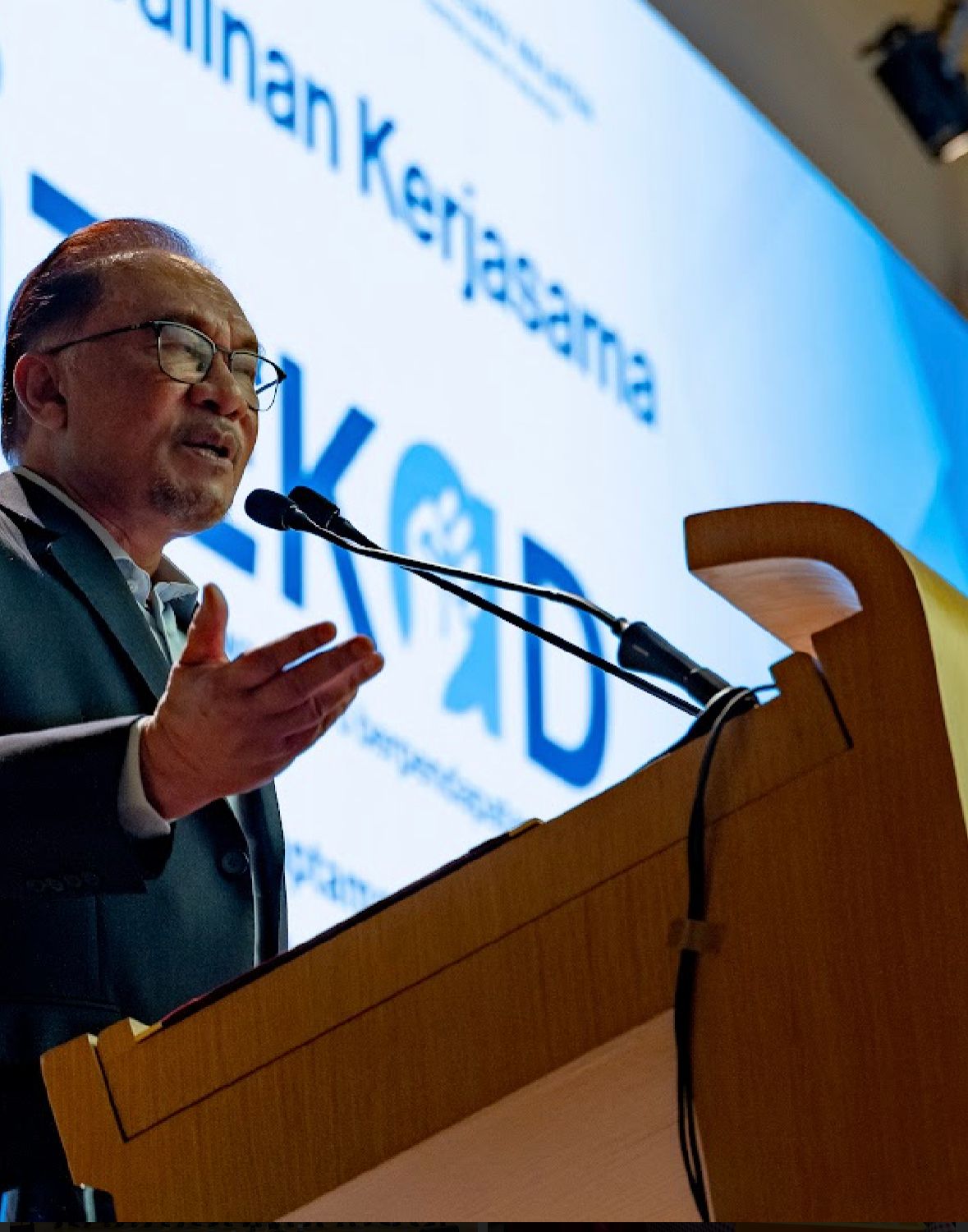Why Did Anwar Fail in His Spread of the Unity Message in Malaysia?
After a prolonged hiatus, I delve into Malaysia's political landscape. This discourse dissects Anwar, the reformist torchbearer's recent state poll campaign setbacks and unravels the reasons behind the apparent stumble


That’s the question I find myself asking after experts and writers argued that his recent elections campaign failed to capture the minds and hearts in the Malay-Muslim belt.
What is more concerning for some of his allies is the push made by those who betrayed him in 2020 in the state where he built his political resurgence in the mid 2000s.
Selangor became a powerhouse of success under Anwar’s party rule. It was already the richest state in Malaysia before the 2008 won by Anwar’s party, ruled by the Umno but the populace decided to enthrust the state’s future to Anwar.
Mismanagement by Umno coupled by Anwar’s popularity meant 2008 would become the beacon year for the REFORMASI movement. But what has changed since then?
Popularity of Anwar
Why is the popular Anwar apparently failing in gathering more support across Malaysia while he is losing appeal among his ‘traditional’ supporters? To understand this shift in allegiance towards Anwar, we must take into consideration several factors that impacted Anwar’s resurgent political career since 2008.
In between see the boxes to have a quick access to what I think went wrong in the recent state polls:
In 2013, the Party Islam Se-Malaysia left the Pakatan Rakyat which was formed with the Party Keadilan Rakyat of Anwar and the Chinese-led Democratic Action Party, an eternal enemy of the Umno until November 2022.
The alliance was formed after the defeat of the PKR in 2004. During the general elections of that year, Anwar’s party headed by his wife, Dr Wan Azizah Wan Ismail, won only one Parliamentary seat. It was a massive reduction from what they won in 1999. The entire opposition was decimated in fact by then PM Abdullah Ahmad Badawi's Barisan Nasional.
Five years later, Anwar, out of jail in 2004, registered a massive victory marking his return in active politics. The PR won 5 states and 82 Parliamentary seats. A record for the opposition.
Another vacuum in the PKR
After a repeat of the success in 2013, Anwar was hit with another sodomy case. He went to jail and this helped create a vacuum in the PKR or Parti Keadilan Rakyat (Justice Party) where his allies were divided. This resulted in a split in the party and in the alliance. PAS left, accusing the DAP of being anti-Islam. A PKR leadership tussle started. It ended badly in 2020.
Anwar’s return to politics in 2018 after his alliance, this time headed by arch-enemy-turned-friend Mahathir Mohammad, defeated Najib Razak in the elections, enhanced the power struggle within the PKR.
Mahathir did a lot to acerbate the division within Anwar’s party by nominating the not-so-pro-Anwar wing in the party to top ministerial posts in his government. He then appointed the DAP leader Lim Guan Eng as the Minister of Finance.
This sparked a riot in the Malay mindset that Mahathir was selling the country to the Chinese. Mahathir knew that Lim Guan Eng will have to focus on Najib Razak and his widely publicised 1MDB scandal.
The Chinese factor and Mahathir
A Chinese laying bare the dirty linen of a Malay leader will never go down well among the Muslims. His running of the Ministry of Finance like a pure Chinese tauke became a highlight among Malay-Muslims. Rumours were spreading that the PH government was suppressing the Malays and the tauke in finance was stripping the Malay companies of all contracts and government deals.

Visit World Future for more foreign news and regional Asean stories
Mahathir did little to help the image of the PH during that period. He created a monster. At the same time, he was having tea and biscuits with the opposition Umno members, Malay kueh or pastries and cookies with the PAS leaders and kept a plot by members of his party the Bersatu and some members in Anwar’s party to block Anwar from taking over as PM after him under wrap.
Sheraton Move
The result was the Sheraton Move, in which Mahathir was to resign as PM while Muhyiddin Yassin was to be given the post of PM instead of Anwar. Muhyiddin had brought his Bersatu out of the PH alliance. Helped by an anti-Anwar block from the PKR, he formed a new government with the help of the Umno and the PAS.
After this long twist in the plot to prevent Anwar from accessing to power, he finally made it to Putrajaya as the 10th PM of Malaysia. His alliance was consistent in winning sufficient seats to make it the biggest political alliance in Malaysia. It defeated the Perikatan Nasional (PN) which is an alliance between the PAS and Bersatu. The PN won only 74 seats.
Anwar as PM
Anwar had no choice but to ally with the Umno after the elections to form a new government with the parties from Borneo. This gave him a large majority in Parliament having 148 seats against the 74 for the opposition.
While the PAS maintained its good run in this month’s state polls, the same should be said of Anwar. His alliance too made a good run winning the three states of Selangor, Negeri Sembilan and Penang.
The PAS, after a terrible campaign of charactor assassination campaign against Anwar and his allies in the state polls failed to win the three most prizes states. It backfired against them though it resulted in a status quo of the Nov 2022 elections. This is seen as a positive outcome by the market and analysts.
Meanwhile, Anwar’s alliance too faced the rebuke of the masses in the Malay belt after it allowed itself to get dragged in the character assassination game. Their attacks against the personality of the Menteri Besar of the state of Kedah, Mohammad Sanusi Nor backfired.
But what went wrong with Anwar’s campaign this time around? Did it really fail to reach the masses? Did Anwar’s communication team really failed in their attempts to deliver the government and Anwar’s messages to the general public?
If they failed completely, Anwar would have lost the three states his alliance controls. This must be taken into consideration.
My five points about the PRN
However, here are five points to consider as the reasons why Anwar could not get more support from the Malay belt and why he lost more Malay support in the urban areas:
- The elections came at the wrong time for Anwar. He had not much under his sleeve to offer to the populace in the Malay belt to win their support.
- The fight against corruption: It took a twist after Anwar signed the alliance with the Umno and bringing the Umno leader into his Cabinet frustrated many Pakatan Harapan supporters.
- The Umno battled in the sideline ahead of the polls to free the convicted Najib Razak. That did not help Anwar in his fight against corruption. It frustrated more supporters who started to believe Anwar will eventually free Najib. The decision however rest with the King of Malaysia but popular beliefs is that Anwar will help Najib break free from his sentencing with a royal pardon.
- The throwing of cash handouts in the form of aid or allowances to some institutions during the elections did hurt Anwar’s image further. People started to believe they - the PH - are not any different than the PN or Umno.
- Subsidies: Anwar as Minister of Finance had a chance to show that PH can keep promises particularly with regards to toll fare and fuel prices. His alliance did nothing but ignore the opposition’s campaign allday and all night long that Anwar makes empty promises. This may have helped his new enemy Azmin Ali, a long-time ally turned opponent within his party until he left in 2020, to win a seat in a PH stronghold in Selangor.
Last but not least
Is it the fault of the communications method of the PH-BN alliance? Partially yes it is their fault since they did not react sharply against these accusations They were slow and at times overwhelmed. They did not fight back against accusations that Anwar is protecting some corrupt leaders or that he and his team made promises they did not keep.
Those alone overrode the false claims from the opposition that infiltrated platforms like TikTok and Facebook where the audience are prepared to believe in conspiracy theories more than the official version of events and facts.
Nevertheless, one can’t blame the comms team or comms leaders solely as they rely heavily on the politicians for the reactions. But then, what was the crisis management arm doing in the wake of the avalanche of fake news, wild allegations and foul, abusive languages used by the opponents against Anwar and his alliance?
Of course they failed lamentably. But the politicians also failed to realise that there was a great need for corrections in their campaigns and in their policies if they really wanted to win more votes in the state elections.

Excerpt: After a prolonged hiatus, I delve into Malaysia's political landscape. This discourse dissects Anwar's recent state poll campaign setbacks and unravels the reasons behind the stumble. Yet, let it be known that the reformist torchbearer, Anwar, has not been vanquished. In the labyrinth of politics, setbacks are mere pauses, not defeats.

